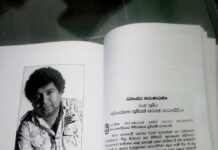What is an encounter?
It is a contingent, chance element of existence. Something happens to you that nothing among your existing world’s points of reference made likely or necessary. You encounter someone who you do not know and yet who strikes you, attracts you, enters into your life.
In your book In Praise of Love, you say, in substance, that there is no encounter without risk…
For it to be a genuine encounter, we must always be able to assume that it is the beginning of a possible adventure. You cannot demand an insurance contract with whomever it is that you have encountered. Since the encounter is incalculable, if you try to reduce this insecurity then you destroy the encounter itself, that is to say, accepting someone entering into your life as a complete person. It is precisely this that distinguishes the encounter from libertinism.
And the encounter, you always say, supposes construction
I say that with regard to what follows from the encounter. It must, indeed, give rise to shared consequences, shared innovations. And this construction cannot be left to pure chance, because it is formed of a whole series of decisions.
‘The encounter is a beginning. But the beginning of what? It is at the point of acceptance: Accepting or refusing what is happening to you’
But right from the outset, the encounter is not, for you, an experience…
Improbability distinguishes it from an ordinary experience. When the encounter happens to you, when you have the very strong feeling that it is happening to you, there is a phenomenon of attraction or repulsion – sometimes the two are mixed – toward what has disturbed the rhythm of your existence. Experience, for its part, can perfectly well fit within your work or family activities, whereas the encounter is a beginning. But the beginning of what? It is at the point of acceptance: accepting or refusing what is happening to you. To take the example of an amorous encounter, the whole problem lies in knowing whether to declare it or not. People speak of a declaration of love. The encounter has to be declared, that is, accepted.
That being the condition for its real existence?
Yes. A person found themselves there at the same time as you were, you exchanged glances, something happened. But unless it is uttered, declared, ratified, the encounter remains in suspense.
Why is philosophy not so concerned with the encounter?
There is a deep historical reason for that. To simplify things, we could say that since its origins philosophy has been divided into two main orientations. The rationalist one, based on the development of the sciences, which proposes that there is an explanation for everything. And the empiricist one, which proposes that everything relates to some experience. So we find ourselves caught between a logic of necessity and a logic of experiences. But the encounter is reducible neither to rationality, nor experience, but represents an element of contingency, and philosophy has no love for contingency. We must, therefore, accept that some things occur within existence that are neither calculable nor experienced. That something happens…
Yes, what is it that happens?
The need to choose. You are constrained, you must accept what happens or else you will alienate, obscure and refuse it. Kierkegaard, the nineteenth-century Danish philosopher and the first existentialist, saw this link between chance and the need to choose. The miracle of the encounter is this paradoxical conjunction between the pure exterior – a person whom I encounter – and pure interiority – the consequences that I must draw by myself…
Is it really a miracle? Is there not a savoir-faire of the encounter: that is, some people are better at it than others?
That is its ‘rationalisable’ side, where the sites of encounter tend to make up a sort of popular savoir-faire. You only engage in the encounter with the right person, with the person who will reduce the margin of insecurity to the minimum. But are these encounters? The pick-up artist who knows how to attract attention to himself probably only takes on the most minimal consequences of the encounter, which risks just being an experience, indeed an asymmetrical one. A person who has savoir-faire is in control; whereas the person who believes it is an encounter, but then realises that it is an experience, suffers.
‘There must be some disposition towards openness, the virtue of accepting that something is happening that you had not foreseen’
But if such ‘savoir-faire’ is placed to one side, then does that not mean that we need special qualities to be happy in the encounter?
There must be some disposition towards openness, thus a fundamental relation of confidence. And moreover, bizarrely, a passive faculty, a sort of virtue – to use an old-fashioned word – the virtue of accepting that something is happening that you had not foreseen.
Today it is interest in the amorous encounter that predominates. Was this always the case?
It has often been said that the Greek world was the world of friendship… I am a little troubled by this retrospective vision according to which the ancient Greeks had the serene world of friendship and the Christian West the impassioned world of love. It is an intellectual construct, elaborated by Denis de Rougement in his late 1930s work L’Amour et l’Occident. In reality, there was love even in Homer’s Iliad: Hector and Andromache are a magnificent couple.
Do the different types of encounter – be they amorous, political or artistic – obey the same rules?
There are some important differences. For example, my main political encounter is probably more an encounter with collective situations rather than with individuals. Similarly, the artistic encounter is the hold that some type of organised imaginary exerts on you. But the common element is always this feeling that ‘this is happening to you’. A novel that changes you, is something that you have to deal with, even if later your taste changes and you ask yourself ‘why did I like this book when I was younger?’, exactly as Proust’s hero asks himself why he loved a woman who ‘wasn’t his type’…
Are we in an epoch favourable to the encounter, or not?
On the one hand, the field of possibility for the encounter is widening, because of our means of transport and communication. On the other hand, as always, this enlargement comes at the cost of a ‘loss of intensity’. Encounters are so easy and numerous that the intensity of the change that we could accept as a result is no longer the same as it once was. We introduce a set of precautions: I will take someone sufficiently similar to me that I can hope to go along with this person while myself remaining exactly the same. This is a tendency of the contemporary world, to introduce a false variety within a vast sameness.
‘I dream of a world where encounters are less coded by the social, professional, cultural and linguistic universes’
Are these not encounters?
No, these are mere consumption. Since the hidden model of all this is the market. You are offered a range of products that change all the time, but always remain the same. Consumption is, in its very essence, repetitive. You can change your ‘type’ of woman, without necessarily needing an encounter.
And the encounter that stays at the virtual stage?
The distinction between the virtual and the real never struck me as being of capital importance. After all, we can have great encounters in the forms of absence, abstinence or virtuality. We can have a love that remains even at a great distance. Heloise and Abelard or Tristan and Isolde are myths, but they indicate that the instances of loving fidelity are extremely varied. We have considerable loyalty for the absent just as we have considerable dishonesty toward the present.
Is it true that we more and more ‘stick to our own kind’?
There are very rigid social divisions that are not of recent vintage. In the nineteenth century, a young daughter of the bourgeoisie did not encounter the worker in the street: she never even saw him. But transgressions are always possible. The most beautiful of Conrad’s novels revolve around this, an English adventurer’s love for a Malayan, and its novelistic substance is to show the intensity of this, even though faced with a slim chance of success. I dream of a world where encounters are less coded by the social, professional, cultural and linguistic universes. If I can allow myself to use a word that is no longer in fashion: less coded by class barriers.
‘The current regression is spectacular. Its tendency is to create micro-milieux, in the image of American society, namely as a collection of ghettoes’
Are they not in fact being accentuated?
Yes. I lived through the late ‘60s to mid-‘70s period, we met a huge number of people whom we would never have met beforehand; and, alas, nor would we do so afterwards. To speak to people who did not have the same culture as us absolutely did not prevent us doing projects together, back then. The current regression is spectacular. Its tendency is not to create mass, class solidarity, but micro-milieux, a type of marquetry, in the image of American society, namely as a collection of ghettoes.
Are we threatened by this in France?
Since commodities are the principal motor of society, each person is called to appear before the market as a subject-consumer. In correlation with this, people fall back on identities, since to be drowned in this abstract world as an individual is a nightmare, wandering without end. So we cling onto family, provincial, national, linguistic and religious identities. Identities that are available to us because they refer back to the dawn of time. It is a world opposed to the encounter, a world of defensive retreat.
A world of the Right, whereas the world of the encounter would be a world of the Left?
I fear that the audacity of the Left does not go very far… It makes so many concessions to the identitarian retreat, to the privatisation of everything. For the people of the nineteenth century, Marx first among them, internationalism was a key notion, one that they opposed to wars and national egoism.
‘Internationalism seems, to me, a value of capital importance if we do not want to be devoured by aggressive identities…’
But this internationalism is constructed against an enemy, the class enemy…
Of course! I am not fanatical about the idea of class that once had a considerable rigidity about it; but internationalism seems, to me, even more than in the nineteenth century, a value of capital importance if we do not want to be devoured by aggressive identities…
So what, ultimately, is an enemy?
Someone who thinks that the world is excellent just as it is now, and that it must continue down the same road.
Is the encounter with an enemy interesting?
It is always interesting to make the contradictions public – as rationally as possible. Above all if your adversary is prepared to debate them without relying on invective. It is like theatre, which has a didactic role…
Was encountering Alain Finkielkraut, as you did in your book L’Explication, an encounter with an enemy?
No, because he does not think that the world is excellent just as it is now and that it must continue down the same road. On the contrary, he is passionately attached to Third Republic-era [1870-1940] schooling. He has this passion, it is honourable, I do not blame him for it: my four grandparents were teachers! So our head-to-head was something of a piece of theatre, with each of us playing his role as a presumed adversary. And I was really struck, I must admit, through the twists and turns of our dialogue, by two points that attest to the truth of our encounter. The first was a form of patriotism that, in the last analysis, I share with him: I love France, its history – the Revolution, the Paris Commune, the Resistance, May ’68 – in sum, the famous France of the rights of man, such as it continues to be viewed abroad. And I suffer its actual state, defensive and tired, its lack of political inventiveness, which I can clearly see that Finkielkraut also suffers, though in my view for mistaken reasons… The second point of mutual understanding was our common recognition that we exist in a world where there are many factors to make intellectuals melancholic. The difference between us is that while Alain Finkielkraut never stops looking for these factors, I for my part try to combat them.
How so?
In directing my attention toward amorous encounters, small political experiences, people of whose existence I am glad, and new works of art. It is not true that society is sterile and empty, even if I am not content with the turn that things have taken. It is a question of encounters. I have always had the impression that Finkielkraut exaggeratedly limits the possible terrain of his encounters.
‘Contrary to what Finkielkraut says, you have an encounter based on what you are, not by making a void within yourself’
Alain Finkielkraut says, in your regard, that ‘As not to exclude anyone, you would have to make a void within yourself, pluck out any substance of your own, and be nothing else, in the last analysis, than the very gesture of opening out to others’…
But I never said that no one should be excluded: and we do have enemies! Contrary to what Finkielkraut says, you have an encounter based on what you are, not by making a void within yourself. He has at least convinced me of one thing: the ideological-political front dividing humanity today does not lie between those who have a melancholic vision of the country (like him) and those who try to have a more creative vision of it (like me). But rather, between those who consider the present state of things excellent, feeling perfectly at ease with it and making propaganda for it, and everyone else…
Is there not also another form of ‘front line’, connected to each person’s intellectual laziness?
We are talking about the ‘external’ enemy, but if you want also to address the ‘internal’ enemy, then yes, of course! Many people barricade themselves within their ignorance of a number of matters, not wanting to have to know – they have a ‘passion for ignorance’, as one of my teachers, Lacan, put it.
In Jean-Luc Godard’s Film socialisme you give a talk in front of… no one!
It is an allegory… Jean-Luc Godard spent a long time telling me that he planned to film me like that. He wanted this sequence to express the idea that on this ship symbolising consumer society, I was a dissident, solitary figure…
Can an author or a philosopher transform your existence?
Of course! The person who most altered my existence was Sartre, to whom I was subsequently very disloyal. In final year high school science class my intention was to become an inspector of forests and lakes – my future was very clear and planned-out. And then I read L’Imaginaire, then Esquisse d’une théorie des émotions, then Being and Nothingness. And I reoriented myself, from the sciences towards letters: it was an overwhelming encounter.
Which artists were decisive encounters, for you?
In the field of poetry, Mallarmé taught me that the power of art hangs on the notion of the event: to think and formalise what happens as it happens, and not as it is. As for music, I learnt from Haydn that you can create extraordinary effects from very little material, using limited and almost banal ‘cells’ of music. This made me used to seeking the extraordinary within the ordinary. As for the visual arts, Tintoretto showed me how a painter can grasp the boldest monumentality of something coming to being, as it is happening.
Different epochs privilege certain types of encounters. For example, we hardly ever speak of mystical encounters. What do you think of these?
Saint Teresa of Avila or Saint John of the Cross had a profound conviction – substituting for the real – of an amorous fusion and an absolute encounter. And I think that these were authentic encounters, even if I think that maybe God does not exist. Then again, to introduce such a conception within worldly love – wanting it to fuse with some ideal archetype – seems dangerous and negative, to me. This leads to something that I do not like much at all: the cult of a supposed feminine transcendence, which we find in German romanticism and was propagated right up until the Surrealists. The last sentence of Goethe’s Faust, ‘The eternal feminine/Draws us on high’ is, for me, a very problematic sentiment. It transposes the mystical order within a terrestrial order that is in part a rebellion against it.
‘Everything is pushing toward an atomisation of society, composed of free consumers who above all else seek the objects that interest them on the world market’
What do you think of a recent study by the Fondation de France reporting that four million French people suffer from loneliness?
The paradigm of the contemporary world is the consumer. Its target, as they say… And objects do not bring you out of loneliness.
But the market has not destroyed the encounter – it is not as powerful as that!
Thank God! You are speaking to an optimist, I have never thought that the market destroyed sociability. Such a catastrophist vision belonged far more to my colleague Jean Baudrillard. There do exist solidarities, encounters, artistic productions: I do not at all have a nihilist vision. But I do see that everything is pushing toward an atomisation of society, composed of free consumers who above all else seek the objects that interest them on the world market.
So the encounter is under threat?
Absolutely. On the cruise ship in Godard’s Film socialisme, there were three thousand people. And I can tell you, they were very lonely.
Alain Badiou;Translated by David Broder























